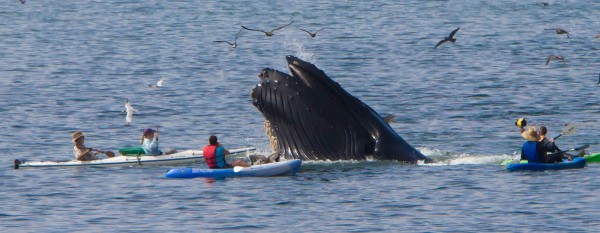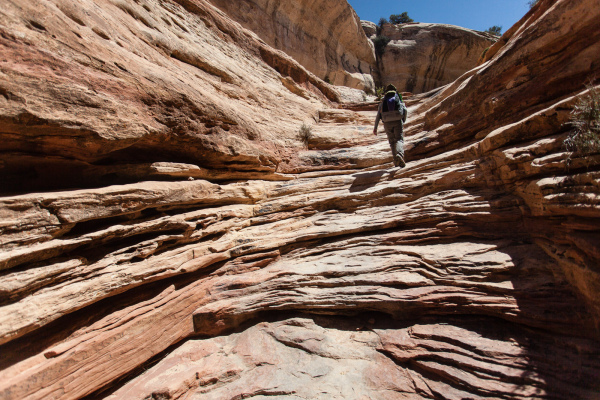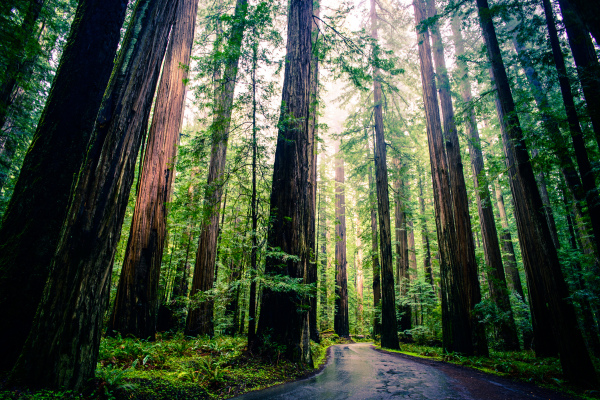In the beginning the word was “ecotourism,” which quickly became a travel industry buzzword. Ecotours and associated products and services became increasingly popular tourism commodities—a trend destined to not only continue but to grow exponentially, given the degree of international interest in and concern over ecological awareness, environmental protection, and cultural sensitivity.
But what is ecotourism, exactly? We can ask the same question of sustainable travel, or green travel, which have become easy synonyms in the 21st century.
The word conjures up vivid images. Ecotourists, we assume, are intrepid travelers setting out for astounding outdoor adventure. They scale unfriendly mountain peaks; trek through lush exotic forests (or brave the high seas) in search of danger and endangered species; risk it all on whitewater raft trips to the ends of the earth; and go native, at least long enough to haggle in remote village markets over the price of local handicrafts.

My Whale Captures by Dawn Beattie, Creative Commons 2014
A desire for adventure grabs many of us. “Adventure travel,” in fact, has become another functional synonym for ecotourism. Yet when international adventure travel spread from the elite upper classes to the world’s relatively affluent middle classes it became an industry in its own right. According to the Adventure Travel Trade Association (ATTA), since 2009 the already fast growing adventure travel market has grown by 65 percent per year, as reported in the 2013 Adventure Tourism Market Study, issued in conjunction by George Washington University.
The ATTA defines adventure travel as travel outings that include at least two of three features—a physical activity, a connection with nature, and interaction with culture—though most trips include all of these. “Soft adventure” activities include volunteer tourism, archaeological expeditions, hiking, kayaking, rafting, and snorkeling. For “hard adventure,” consider caving, climbing, trekking, or even heli-skiing, kite surfing, and paragliding.
According to the ATTA, when specialized clothing and gear are added to the total, international adventure travelers spent some $345 billion in 2012. Demonstrating that the economy has indeed recovered, at least for some, the average per-person cost for travel adventures grew from $593 per trip in 2009 to $947 in 2012.
But the phenomenal success of adventure travel has led to phenomenal problems. The concepts created by adventure travelers to provide solutions for those problems—“sustainable travel,” “responsible travel,” “ethical travel,” and “appropriate tourism” among them—have been fully embraced as core elements of ecotourism.

Bullet Canyon by Greg Wills, Creative Commons 2014
Responsible tourism involves making s commitment “to help sustain the earth’s diversity of cultures as well as its social, economic, and natural resources,” observed Jim Molnar, Seattle Times travel writer, way back in 1989. “And already it seems no more than common sense: Visit another culture with thoughtfulness and sensitivity, and come home with good will and understanding along with your memories.”
Still, what is ecotourism? Arriving at a useful and universal definition has been daunting, both for travelers and the travel industry. The International Ecotourism Society (TIES) defines ecotourism as: “responsible travel to natural areas that conserves the environment and improves the well-being of local people.”
According to TIES ecotourism is also about “uniting conservation, communities, and sustainable travel,” and requires a commitment to:
- Minimize impact
- Build environmental and cultural awareness and respect
- Provide positive experiences for both visitors and hosts
- Provide direct financial benefits for conservation
- Provide financial benefits and empowerment for local people
- Raise sensitivity to host countries’ political, environmental, and social climate
By definition, then, ecotourism includes not just nature appreciation and outdoor adventure but almost every other aspect of a particular place, including its culture, economy, history, and politics. Indeed, the “eco” in ecotourism—from the Greek oikos, “house” or “home”—resonates with the essential original meaning of ecology: the interrelationships of all living things with each other and with their environment.
Bringing it All Back Home
The history of travel is the history of adventurism, more than adventure. Browse through world military history to appreciate this truth at its most basic and brutish. If early world travelers weren’t warriors then most were economic adventurers. Only in the 1800s did significant numbers of people begin to travel for pleasure. The world’s first tourists were a privileged few. Until quite recently even most travel literature reflected the casual haughtiness of the leisured classes. And why not? Everyone else stayed home.
Then came World War II and a political conflagration that ultimately redrew the entire map of the world. The war also eliminated most official vestiges of colonialism and created two world superpowers, while motivating later contenders.
New technological developments—including large capacity transport as well as rugged combat gear and equipment easily converted to recreational use—were other war-related legacies. By the 1950s and 1960s, previously isolated and isolationist people from all parts of the globe, and particularly the U.S., had become enthusiastic world travelers. The rest, as they say, is history. Travel is now the world’s largest service sector industry.
Modern travelers want more than mere entertainment. We expect to experience a place, to know it. We crave connection. Responsible tourism can provide us with that connection, as well as grant lasting economic and environmental benefits.
So now we simply need to bring it all back home.
Imagine how profoundly Northern California would change if we adventure travelers came home to ask who collects the profits every time we check into a local hotel or motel. Or if we insisted that our favorite restaurants donate a percentage of earnings to community organizations. Local economies would flourish.
And what would life here be like if we returning travelers made the effort to understand and participate in the broader cultural and political life of our communities, and if we routinely challenged our leaders over cultural, economic, and environmental ethics?
Ecotourism might even save the world. We Americans will become more credible as its worldwide ambassadors once we start to apply its moral and ethical principles at home as well as abroad.

Redwoods by Michael Balint, Creative Commons 2014
How do we travel wisely and well, both abroad and in our own backyard?
In the beginning the word was “ecotourism,” which quickly became a travel industry buzzword. Ecotours and associated products and services became increasingly popular tourism commodities—a trend destined to not only continue but to grow exponentially, given the degree of international interest in and concern over ecological awareness, environmental protection, and cultural sensitivity.
But what is ecotourism, exactly? We can ask the same question of sustainable travel, or green travel, which have become easy synonyms in the 21st century.
The word conjures up vivid images. Ecotourists, we assume, are intrepid travelers setting out for astounding outdoor adventure. They scale unfriendly mountain peaks; trek through lush exotic forests (or brave the high seas) in search of danger and endangered species; risk it all on whitewater raft trips to the ends of the earth; and go native, at least long enough to haggle in remote village markets over the price of local handicrafts.
My Whale Captures by Dawn Beattie, Creative Commons 2014
A desire for adventure grabs many of us. “Adventure travel,” in fact, has become another functional synonym for ecotourism. Yet when international adventure travel spread from the elite upper classes to the world’s relatively affluent middle classes it became an industry in its own right. According to the Adventure Travel Trade Association (ATTA), since 2009 the already fast growing adventure travel market has grown by 65 percent per year, as reported in the 2013 Adventure Tourism Market Study, issued in conjunction by George Washington University.
The ATTA defines adventure travel as travel outings that include at least two of three features—a physical activity, a connection with nature, and interaction with culture—though most trips include all of these. “Soft adventure” activities include volunteer tourism, archaeological expeditions, hiking, kayaking, rafting, and snorkeling. For “hard adventure,” consider caving, climbing, trekking, or even heli-skiing, kite surfing, and paragliding.
According to the ATTA, when specialized clothing and gear are added to the total, international adventure travelers spent some $345 billion in 2012. Demonstrating that the economy has indeed recovered, at least for some, the average per-person cost for travel adventures grew from $593 per trip in 2009 to $947 in 2012.
But the phenomenal success of adventure travel has led to phenomenal problems. The concepts created by adventure travelers to provide solutions for those problems—“sustainable travel,” “responsible travel,” “ethical travel,” and “appropriate tourism” among them—have been fully embraced as core elements of ecotourism.
Bullet Canyon by Greg Wills, Creative Commons 2014
Responsible tourism involves making s commitment “to help sustain the earth’s diversity of cultures as well as its social, economic, and natural resources,” observed Jim Molnar, Seattle Times travel writer, way back in 1989. “And already it seems no more than common sense: Visit another culture with thoughtfulness and sensitivity, and come home with good will and understanding along with your memories.”
Still, what is ecotourism? Arriving at a useful and universal definition has been daunting, both for travelers and the travel industry. The International Ecotourism Society (TIES) defines ecotourism as: “responsible travel to natural areas that conserves the environment and improves the well-being of local people.”
According to TIES ecotourism is also about “uniting conservation, communities, and sustainable travel,” and requires a commitment to:
By definition, then, ecotourism includes not just nature appreciation and outdoor adventure but almost every other aspect of a particular place, including its culture, economy, history, and politics. Indeed, the “eco” in ecotourism—from the Greek oikos, “house” or “home”—resonates with the essential original meaning of ecology: the interrelationships of all living things with each other and with their environment.
Bringing it All Back Home
The history of travel is the history of adventurism, more than adventure. Browse through world military history to appreciate this truth at its most basic and brutish. If early world travelers weren’t warriors then most were economic adventurers. Only in the 1800s did significant numbers of people begin to travel for pleasure. The world’s first tourists were a privileged few. Until quite recently even most travel literature reflected the casual haughtiness of the leisured classes. And why not? Everyone else stayed home.
Then came World War II and a political conflagration that ultimately redrew the entire map of the world. The war also eliminated most official vestiges of colonialism and created two world superpowers, while motivating later contenders.
New technological developments—including large capacity transport as well as rugged combat gear and equipment easily converted to recreational use—were other war-related legacies. By the 1950s and 1960s, previously isolated and isolationist people from all parts of the globe, and particularly the U.S., had become enthusiastic world travelers. The rest, as they say, is history. Travel is now the world’s largest service sector industry.
Modern travelers want more than mere entertainment. We expect to experience a place, to know it. We crave connection. Responsible tourism can provide us with that connection, as well as grant lasting economic and environmental benefits.
So now we simply need to bring it all back home.
Imagine how profoundly Northern California would change if we adventure travelers came home to ask who collects the profits every time we check into a local hotel or motel. Or if we insisted that our favorite restaurants donate a percentage of earnings to community organizations. Local economies would flourish.
And what would life here be like if we returning travelers made the effort to understand and participate in the broader cultural and political life of our communities, and if we routinely challenged our leaders over cultural, economic, and environmental ethics?
Ecotourism might even save the world. We Americans will become more credible as its worldwide ambassadors once we start to apply its moral and ethical principles at home as well as abroad.
Redwoods by Michael Balint, Creative Commons 2014